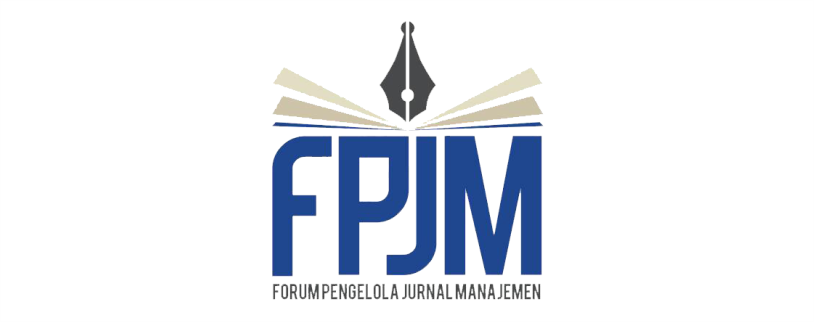Determinants of Financial Management Behavior among Young Millennial Entrepreneurs
DOI:
https://doi.org/10.26905/jmdk.v12i2.13187Keywords:
Financial Literacy, Income, Hedonism Lifestyle, Financial Attitude, Self Control, Financial Management BehaviorAbstract
Effective financial management behavior can improve a person's financial well-being, while failure to manage personal finances can have long-term impacts. This research aims to examine the factors that influence Financial Management Behavior in young enterpreneurs. The research method used in this research is quantitative. The total number of respondents was 100 millennial entrepreneurs who are members of the Indonesian Young Entrepreneurs Association (HIPMI) in East Java Province spread across several cities. The sampling technique used was a purposive sampling technique with a data collection method in the form of a questionnaire. The research results show that Financial Literacy, Hedonism Lifestyle, Financial Attitude, and Self Control influence Financial Management Behavior while Income does not influence Financial Management Behavior. The novelty in this research is adding the influence of a lifestyle of hedonism and self-control in the context of millennial entrepreneurs, a group that is rarely the main focus in financial management studies in Indonesia. The results of this research provide practical implications for organizations such as HIPMI to develop financial education programs that not only increase financial literacy but also emphasize the importance of self-control and lifestyle management. In addition, this research can be a basis for the government to design policies that support the financial well-being of young entrepreneurs.
Downloads
References
Ahmad, A. (2021). The Impact of Locus of Control, Financial Attitudes, Income, and Religiosity on Financial Behavior. Management & Accounting Expose, 2(2), 105–115. https://doi.org/10.36441/mae.v2i2.102
Aulianingrum, RD, & Rochmawati. (2021). The Influence of Financial Literacy, Parents' Socioeconomic Status, and Lifestyle on Students' Personal Financial Management. Journal of Economic Education: Scientific Journal of Education, Economics and Social Sciences, 15(2), 198–206. https://doi.org/10.19184/jpe.v15i2.24894
Ajzen, I. (1991). The theory of planned behavior. Organizational Behavior and Human Decision Processes, 50(2), 179–211.
Alfarisi, MF (2019). Analysis of the Influence of Financial Attitude, Financial Knowledge, Parental Education and Parental Income on Financial Management Behavior in Undergraduate Students at Andalas University, Padang. 4(1), 360–371.
Ameliawati, M., & Setiyani, R. (2018). The Influence of Financial Attitude, Financial Socialization, and Financial Experience to Financial Management Behavior with Financial Literacy as the Mediation Variable. KnE Social Sciences, 3(10), 811–823. https://doi.org/10.18502/kss.v3i10.3174
Baptista, S.M.J. (2021). The Influence of Financial Attitude, Financial Literacy, and Locus of Control on Financial Management Behavior (Case Study Working-Age of Semarang). International Journal of Social Science and Business, 5(1), 93–98. https://doi.org/10.23887/ijssb.v5i1.31407
Chen, H. (1998). An analysis of personal financial literacy among college students. Financial Services Review, 7(2), 107–128. https://doi.org/10.1016/s1057-0810(99)80006-7
Chuah, S.C., Kamaruddin, J.N., & Singh, J.S.K. (2020). Factors influencing financial management behavior among university students. Malaysian Journal of Consumer and
Family Economics, 25, 154–174.
Dew, J., & Xiao, J. J. (2011). The financial management behavior scale: Development and validation. Journal of Financial Counseling and Planning, 22(1), 43–59.
Dewi, NLPK, Gama, AWS, & Astiti, NPY (2021). The influence of financial literacy, hedonistic lifestyle, and income on the financial management of Unmas students. GOLD Journal, 2, 74–86.
Djaali, PD . (2020). Quantitative Research Methods (BS Fatmawati (ed.)). PT Bumi Aksara.
Dwinta, I. and CY (2010). The Influence of Locus of Control, Financial Knowledge, Income on Financial Management Behavior. Journal of Business and Accounting, 12(3), 131–144.
Fazli Sabri, M., & Tze Juen, T. (2014). The influence of financial literacy, saving behavior, and financial management on retirement confidence among women working in the Malaysian public sector. Asian Social Science, 10(14), 40–51. https://doi.org/10.5539/ass.v10n14p40
Humaira, I., & Sagoro, E.M. (2018). The Influence of Financial Knowledge, Financial Attitudes, and Personality on Financial Management Behavior in Umkm Actors at the Batik Craft Center of Bantul Regency. Nominal, Accounting and Management Research Barometer, 7(1). https://doi.org/10.21831/nominal.v7i1.19363
Ida, I., Zaniarti, S., & Wijaya, GE (2020). Financial Literacy, Money Attitude, and Financial Management Behavior of the Millennial Generation. Estuary Journal of Economics and Business, 4(2), 406. https://doi.org/10.24912/jmieb.v4i2.9144
Kholilah, N. Al, & Iramani, R. (2013). Study of Financial Management Behavior in Surabaya Society. Journal of Business and Banking, 3 (1), 69. https://doi.org/10.14414/jbb.v3i1.255
Kusnandar, DL, & Kurniawan, D. (2020). Financial Literacy and Lifestyle of Housewives in Shaping Financial Behavior in Tasikmalaya. Science: Journal of Management And Business, 13(1), 123–143. https://doi.org/10.35448/jmb.v13i1.7920
Gaddafi, M., Aryani, RA, & Heikal, M. (2021). The Effect of Financial Knowledge and Personal Net Income on the Financial Behavior of Malikussaleh University Employees With Locus of Control As Moderating Variables. International Journal of Economic, Business, Accounting, Agriculture Management and Sharia Administration (IJEBAS), 1(1), 1–13. https://doi.org/10.54443/ijebas.v1i1.1
Komaria, N. (2020). The Influence of Financial Attitude, Financial Knowledge, and Personal Income on Personal Financial Management Behavior in Millennial Generation Employees of Pt. Petrokimia Gresik. Journal of Chemical Information and Modeling, 53(9), 1689–1699.
Muntanganah, S., Cahyo, H., Setiawan, H., & Rahmah, S. (2021). Financial Literacy, Income and Lifestyle on Financial Management during the Pandemic. Batanghari University Jambi Scientific Journal, 21(3), 1245–1248. https://doi.org/10.33087/jiubj.v21i3.1647
Nofsinger, J.R. (2005). Social Mood and Financial Economics. Journal of Behavioral Finance, 6(3), 144–160. https://doi.org/10.1207/s15427579jpfm0603_4
Parmitasari, RDA, Alwi, Z., & S., S. (2018). The Influence of Spiritual Intelligence and Hedonistic Lifestyle on Personal Financial Management of State University Students in Makassar City. Journal of Minds: Management of Ideas and Inspiration, 5(2), 147–162. https://doi.org/10.24252/minds.v5i2.5699
Pramedi, AD, & Haryono, NA (2021). The Influence of Financial Literacy, Financial Knowledge, Financial Attitude, Income and Financial Self Efficacy on the Financial Management Behavior of Entrepreneurs of University Graduates in Surabaya. Journal of Management Science, 9(2), 572. https://doi.org/10.26740/jim.v9n2.p572-586
Prihartono, MRD, & Asandimitra, N. (2018). Analysis of Factors Influencing Financial Management Behavior. International Journal of Academic Research in Business and Social Sciences, 8(8), 308–326. https://doi.org/10.6007/ijarbss/v8-i8/4471
Prof, O., & Haymans, A. (2012). Behavioral Finance Theory (Behavior Finance) 1. 1998.
Putra, PD, Harahap, K., & Rahmah, SS (2020). The Hedonism Lifestyle, Financial Literacy and Financial Management Among Business Education Students To Financial Management. Journal of Community Research and Service, 4(1), 32–38. https://doi.org/10.24114/jcrs.v4i1.18287
Putri, NA, & Lestari, D. (2019). The Influence of Lifestyle and Financial Literacy on the Financial Management of Young Workers in Jakarta. ACCURACY: Journal of Accounting and Finance Research, 1(1), 31–42. https://doi.org/10.36407/akurasi.v1i1.61
Putra, A., Handayani, S., & Pambudi, A. (2013). Self-control behavior in personal financial management behavior is based on the theory of planned behavior using a partial least squares approach. JP FEB Unsoed, 3(1), 309–314.
Rahman, A., & Risman, A. (2021). Is Financial Behavior Affected by Income, Learning Finance, and Lifestyle? The EUrASEANs: Journal on Global Socio-Economic Dynamics, 4(29), 29–40. https://doi.org/https://doi.org/10.35678/2539-5645.4%20(29).2021
Reviandani, W. (2019). The Influence of Financial Experience and Income Level on Family Financial Behavior in Yosowilangun Village, Manyar Gresik District. Managerial, 6(01), 48. https://doi.org/10.30587/manajerial.v6i01.862
Rohmanto, F., & Susanti, A. (2021). The Influence of Financial Literacy, Hedonic Lifestyle, and Personal Financial Attitudes on Student Financial Behavior. Ecobisma (Journal of Economics, Business and Management), 8(1), 40–48. https://doi.org/10.36987/ecobi.v8i1.2057
Safura Azizah, N. (2020). The Influence of Financial Literacy, Lifestyle on Financial Behavior in the Millennial Generation. Prisma (Accounting Student Research Platform), 01(02), 92–101.
Sari, N. (2021). The Influence of Financial Literacy, Locus of Control, Life Style, and Gender on the Financial Management Behavior of Surabaya State University Students. Journal of Management Science, 9(2), 670-680. https://doi.org/10.26740/jim.v9n2.p670-680
Sampoerno, AE, & Asandimitra, N. (2021). The Influence of Financial Literacy, Income, Hedonism Lifestyle, Self-Control, and Risk Tolerance on Financial Management Behavior in the Millennial Generation. Journal of Management Science (JIM), 9(3), 1002–1014. https://doi.org/http://dx.doi.org/10.26740/jim.v9n3.p%25p
Segara, T. (2017). Indonesia's National Financial Literacy Strategy (Revisited 2017). Financial Services Authority, 1–99.
Siswanti, I., and AM Halida. 2020. Financial knowledge, financial attitude, and financial management behavior: Self-control as mediating. The International Journal of Accounting and Business Society 28 (01): 71–98.
Skinner, E. A. (1996). A Guide to Constructs of Control. Journal of Personality and Social Psychology, 71(3), 549–570. https://doi.org/10.1037/0022-3514.71.3.549
Strömbäck, C., T. Lind, K. Skagerlund, D. Västfjäll, and G. Tinghög. 2017. Does self-control predict financial behavior and financial well-being? Journal of Behavioral and Experimental Finance 14: 30–38.
Trimartati, N. (2014). Case Study of the Hedonistic Lifestyle of Guidance and Counseling Students Class of 2011 at Ahmad Dahlan University. PSYCHOPEDAGOGIA Journal of Guidance and Counseling, 3(1), 20. https://doi.org/10.12928/psikopedagogia.v3i1.4462
Waspada, IP, & Mulyani, H. (2020). Improving Student Financial Management Behavior Through Financial Literacy and Financial Self-Efficacy. JPAK: Journal of Accounting and Finance Education, 8(1), 87–96. https://doi.org/10.17509/jpak.v8i1.21938
Wasita, PAA, Artaningrum, RG, & Clarissa, SV (2021). The Influence of Financial Literacy and Financial Attitudes on Financial Behavior with Self-Efficacy as a Mediating Variable. JIMAT (Scientific Journal of Accounting Students), 13(01), 310–320. https://doi.org/10.23887/jimat.v13i01.43398
Wardani, D.K., Primastiwi, A., & Helisastri, R. (2022). the Effect of Social Media Use on
Students Financial Management Behavior With Self Control As a Moderating Variable. Profitability Management Science Journal, 6(1), 139–144. https://doi.org/10.26618/profitability.v6i1.6963
Downloads
Published
Issue
Section
License
Authors who publish with this journal agree to the following terms:
(1)Â Copyright of the published articles will be transferred to the journal as the publisher of the manuscripts. Therefore, the author confirms that the copyright has been managed by the journal.
(2) Publisher of Jurnal Penelitian is University of Merdeka Malang.
(3) The copyright follows Creative Commons Attribution–ShareAlike License (CC BY SA): This license allows to Share — copy and redistribute the material in any medium or format, Adapt — remix, transform, and build upon the material, for any purpose, even commercially.












